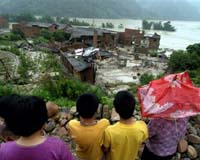 |
Ishinomaki, Japan (AFP) May 9, 2011 It oozes and reeks and sometimes it shimmers in oily rainbow colours. Millions of tonnes of putrid mud now fill every nook and cranny of Japan's tsunami disaster zone. Volunteers who have spent weekends shovelling it out of survivors' half-wrecked homes have developed an intimate relationship with the muck that soils their overalls, gloves and workboots. "It looks like layered chocolate cake, but it smells like a mix of saltwater and oil," said Masato Arima, 35, a Tokyo project manager with a financial services firm, wearing a yellow hardhat and industrial facemask. Joji Hiratsuka, another volunteer working in the devastated port town of Ishinomaki with aid group Nadia, has a different take on the stuff. "It's like rancid Jell-O. It's black. You can't describe the smell -- oil, dead fish, everything. There's petroleum from cars, boats and oil tanks. It's not organic. It's like the ocean, but in a bad way." Ishinomaki is littered with dramatic evidence of the March 11 quake and the monster wave it spawned that erased entire neighbourhoods here and left almost 25,000 people dead or missing along the shattered Pacific coast. Cars now stick out at odd angles from a graveyard, watched over silently by stone Buddhas. Fishing boats lie scattered amid broken houses. And a Statue of Liberty figure towers oddly over a debris-strewn river island. But while bulldozers and cranes will eventually remove the large-scale wreckage of Japan's epic catastrophe, clearing the mud from thousands of homes is a job that must be done by hand, one scoop at a time. "Someone has to do it," said Christine Lavoie-Gagnon, whose volunteer group Nadia (a name that means "Hope") took more than 100 people by bus to the town in the just-ended "Golden Week" of public holidays. "People here have had the shock of their lives, something that only happens once every 1,000 years," she said. "They're left with their sorrow and fatigue -- and lots of mud in their houses. "Money is good, but they also need hands. Three of us came in the beginning, and now there are lots of us. We have people from Asia, Europe and the Americas. Hands don't have nationalities. "We come back so people don't feel alone with their mud. We do whatever they ask us to do." The gritty labour has made the volunteers appreciate their day jobs -- many of them are traders, brokers and staff at major global financial institutions. Yet most of them have kept coming back for more. "The insides of these houses look like they went through a mixer," said Hiratsuka, 49, a Canadian derivatives trader and ice hockey player dubbed "the human bulldozer" by his team-mates. "We come and help people clean out their houses. They may not even be able to live there again, but it gives them breathing space. An elderly couple can't dig through a tonne of dirt. They need help." There are better and worse days. "One day we found about 20 kilograms (45 pounds) of chicken buried in the mud. It had been there for about three weeks, it was fermented and slimy," Hiratsuka said, clearly not relishing the memory. The more rewarding finds are families' mementos and keepsakes -- photographs, religious icons, urns with relatives' ashes -- that volunteers sometimes find in the mud, clean up and return to the families. The job is not just about muscle power, but also emotional support. Mother-of-two Yukako Ishikawa was so moved by the group's help in her half-destroyed childhood home that she likened the motley crew of workers in outdoor wear and hazmat suits to a flock of deities. "When I was alone here, I felt so much fear," said Ishikawa, 36, who survived the tsunami when she took her young children and elderly parents to a nearby elementary school building with only minutes to spare. Her family shuddered for days in the darkness and cold, waiting for help. Desperate for food, Ishikawa waded back through waist-deep water to salvage drink bottles, cans and plastic-sealed food from the flooded kitchen. As the muddy waters receded, she returned to the two-storey house, the detritus of their former lives now a jumbled and soggy mess, wondering if and when she could start to reclaim her life. "I was alone here in a house full of mud," she said, as volunteers around her filled wheelbarrows and sandbags with black earth, cleaned hand-carved window frames and restored a small Japanese garden. "They helped me through the hard time. Now I feel I can move forward."
Share This Article With Planet Earth
Related Links Bringing Order To A World Of Disasters A world of storm and tempest When the Earth Quakes
 China to uproot 240,000 from disaster-prone areas
China to uproot 240,000 from disaster-prone areasBeijing (AFP) May 7, 2011 Authorities plan to move nearly a quarter of a million people this year from disaster-prone areas in northern China into newly-built homes, state media reported Saturday. About 240,000 will be moved in the first stage of a ten-year project to shift 2.4 million people away from less-developed mountainous areas in Shaanxi province, the official Xinhua news agency reported. The total number ... read more |
|
| The content herein, unless otherwise known to be public domain, are Copyright 1995-2010 - SpaceDaily. AFP and UPI Wire Stories are copyright Agence France-Presse and United Press International. ESA Portal Reports are copyright European Space Agency. All NASA sourced material is public domain. Additional copyrights may apply in whole or part to other bona fide parties. Advertising does not imply endorsement,agreement or approval of any opinions, statements or information provided by SpaceDaily on any Web page published or hosted by SpaceDaily. Privacy Statement |